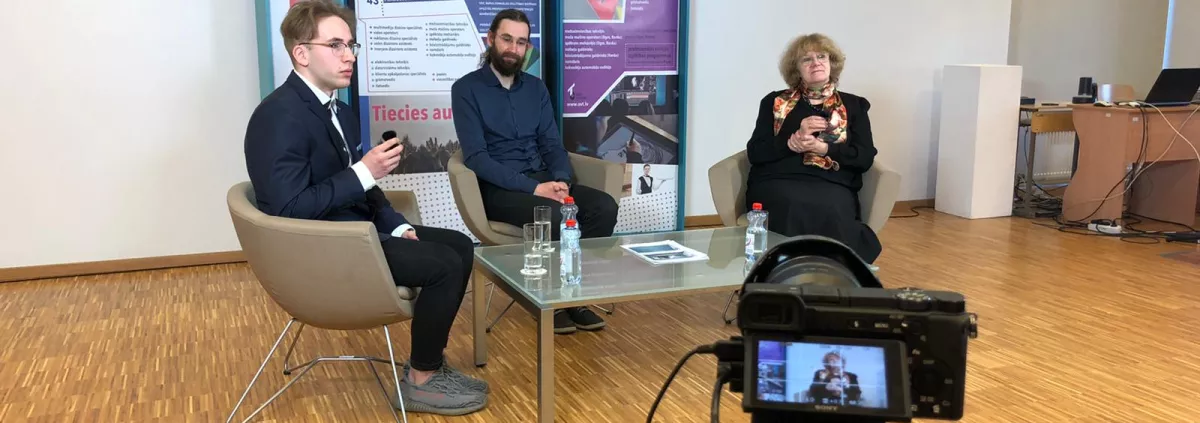From March 2021 until the end of June 2021, representatives of Latvian VET organizations in cooperation with European Training foundation shared experience with Centres of Vocational Excellence (CoVE) from Albania, Armenia, Belarus, Kazakhstan, Moldova, and North Macedonia on how to attract primary school students and create increasing interest in the profession in the existing VET students, how to involve entrepreneurs in WBL, how WBL is step by step implemented in Latvia and how we can gain from Tutor Training.
The participants of the virtual coaching sessions gained information and shared their experience, too; thus, each session was evaluated not only as a dissemination of Latvian experience but also as a distribution of good practice among Latvia - Albania - North Macedonia and Latvia – Armenia – Belarus – Kazakhstan - Moldova.
1st Coaching session “Career education”
In Latvia, career education starts from pre-school, organizing field workshops to arouse children's interest in the profession. Further career education is provided in the basic schooling (for example, career days in primary schools, open days, integrated career classes, etc) and in the vocational training phase, for example, through internal or regional mastery competitions. The support and involvement of the industry and its companies in both informative and practical activities provide various benefits not only for students but also for employers. The more the employers get involved in the teaching process, the greater the guarantees that the resulting qualifications will meet the actual needs of the industry.
2nd Coaching session “Motivating and engaging businesses to get involved in WBL”
One of the most important questions is how to involve employers and get them interested in WBL so that they would not only be interested in implementing WBL but would also actively promote and support it. In Latvia, the role of Sectoral Expert Councils in the implementation of WBL is essential; the Sectoral Expert Councils not only promote WBL and make proposals for the improvement of the WBL system but also disseminate information on WBL opportunities, encouraging companies to become involved. Also, the companies themselves promote WBL in the public space by participating in seminars, meetings of industry professional organizations, and the annual education exhibition, and by receiving guests from different countries and demonstrating experience in the company itself. It promotes recognition and awareness of WBL and interest among the companies.
3rd Coaching session “Practical issues on WBL organization”
Every WBL implementation process starts with a search for cooperation partners - without the involvement of employers and industry, vocational education is not possible. All players of WBL - the school, the company, and the student - have their own requirements, rights, obligations, and also benefits. Milestone of WBL is the evaluation of the results of internship in accordance with the developed evaluation criteria (information about the internship location, significance in the Latvian economy, tasks performed, acquired skills, abilities, conclusions, planned tasks for the next internship), as well as taking into account the description of the student provided by the tutors of both the company and the VET institution, and drawing joint conclusions and setting challenges for future practice.
4th Coaching session “Tutor ‘s role in WBL”
A company tutor is the key person in the implementation of WBL. The tutors’ main task is not just supervising the course of the WBL and implementing practical training but more important is to create a positive, trustful and reliable atmosphere in the workplace. Excellent tutor understands the intern’s problems and actively engages in settlement of these problems, is tolerant in issues that may arise from various cultural, gender, mentality and differences of other nature, and respects these differences, follows ethical, as well as confidentiality aspects, and at work shows honesty and coordinated actions. That is why Latvia has special requirements for the tutor. The tutor must have an eligible professional qualification and must comply with additional requirements on pedagogical competence. But we always have to keep in mind that not everyone can and should be a teacher.
5th Coaching session “Tutor training as a key to high-quality WBL”
Communication and cooperation of the 3 key persons (VET school tutor, VET trainee, company tutor) is necessary throughout the process of WBL - before, during, and after. Training of tutors helps them understand how VET and WBL work and the essential role and importance of the tutor and the enterprise; it facilitates exchange of experience and peer learning, develops new knowledge and skills. Often the training of a company tutor takes place in conjunction with VET school tutor training. This is very good because working together the parties begin to understand each other's hard work and its importance in teaching young people, as well as the fact that only together good results can be achieved. Supporting the trainee in WBL is a teamwork of the VET school and the company. It motivates and leads to quality.
Representatives of CoVEs highly appreciated the individual approach in implementing the WBL in Latvia. The discussion emphasized the importance of students' attitudes towards work, responsibility, punctuality, quality of work, etc., which will affect students as they enter the labour market.
After each coaching session, participants became interested in new topics. Therefore, starting from the autumn of 2021, we will continue discussions on how to achieve learning through work, how to involve parents in Career education and WBL, and how the learning skills are assessed.
Have an energy-rich summer that gives new impetus to the start of the new school year!

P.S. If you have any questions, please don’t hesitate to contact us (sigita.jasinska@ovt.lv)! We will be happy to clarify and help.
Who is organising training of tutors (they are also called in-company mentors)? It would be good to see the outline of their training programme.
Please log in or sign up to comment.